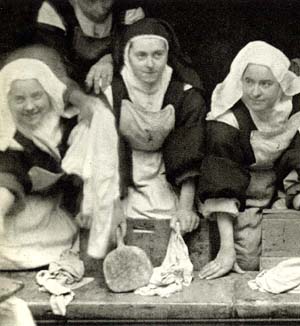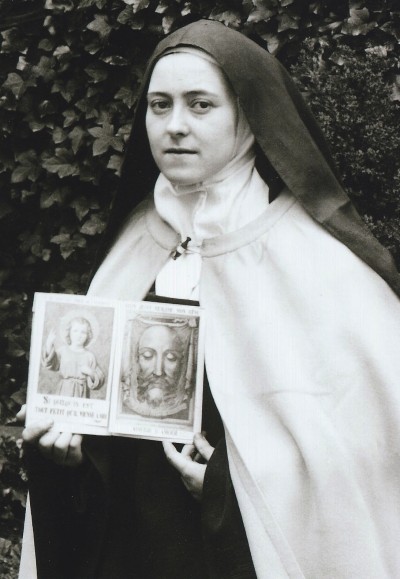God’s Liturgical Providence Speaks of St. Thérèse

Although St. Thérèse of the Child Jesus and of the Holy Face is constantly on our mind in the monastery — and more often than not in our conversation too — this is all the more so as we approach her feast. Since she is a secondary patron of the monastery of Our Lady of the Cenacle, we celebrate her as a lesser solemnity.
It is, then, a delight to us to discover all the events of the week, seemingly, speaking with the voice of little Thérèse.
The Liturgical Providence of God
A favorite theme of the monks is the liturgical providence of God. It seems that in the Sacred Liturgy, everything bespeaks the very things we must need to hear. The liturgy has the very words that seem Spirit-breathed for every occasion.
This week, we have heard again and again the words of the 18th Sunday after Pentecost. There have been several ferial days this week, and we have repeated the words of this Mass that seems almost tailor-made to be a Mass of St. Thérèse. I will let you reflect on it yourself, if you feel so moved, and content myself with just drawing out a few of the most obvious points.
The Collect
| Dírigat corda nostra, quǽsumus, Dómine, tuæ miseratiónis operátio: quia tibi sine te placére non póssumus. | May the working of Thy mercy, we beseech Thee, O Lord, direct our hearts, for we cannot please Thee without Thee. |
Three words jump off the page from this prayer because of how important they are to St. Thérèse: Mercy, direct (or guide), to please.
God’s Pleasure

This collect must have pleased St. Thérèse when it came around every year, as we can easily see if we compare this collect with a few quotations from her. Doing everything for pleasing God was at the centre of her spirituality. In fact, she writes that her whole motivation was God’s pleasure. Like a little child, she wanted only to please her Heavenly Father.
“The great saints have worked for God’s glory, but I, who am only a very little soul, I work only for His pleasure, His whims. And I would be happy to bear the greatest sufferings—even without God’s knowing it, if this were possible—not for the purpose of giving Him a passing glory, but if only I knew that in this way a smile would rise to His lips.” –Last Conversations, Conversations with her Sister Marie, July 16
This was her whole occupation. She busied herself not at all with big things, but only with the flowers of love.
“I’ve always remained little, therefore, having no other occupation but to gather flowers, the flowers of love and sacrifice, and of offering them to God in order to please Him.” –Last Conversations, Yellow Notebook of Mother Agnes, Aug 6, n. 8
This was even to the exclusion of other motivations that are good and honourable in themselves. As her sister, Marie, reports:
“I was telling her that a certain little hymn in honor of St. Martha had been the occasion of merits for her; she said: ‘Not merits! To please God. . . . If I had amassed merits, I would have despaired immediately.’” –Last Conversations, With Her Sister Marie, July 29
And also, she says:
“I would not want to have picked up a pin to avoid purgatory. Everything I did was done to please God, to save souls for Him” –Last Conversations, Yellow Notebook of Mother Agnes, July 30, n. 3
Finally:
“If God were to say to me: ‘If you die right now, you will obtain great glory; if you die at the age of eighty, your glory will be far less, but it will please me much more,’ I would not hesitate to answer: ‘My God, I want to die at eighty, for I am not seeking my own glory, but I only want to please You.’ –Last Conversations, Conversations with her Sister Marie, July 16
But the second part of the collect, is not less important
God’s Direction
But no less important to her was that God was directing everything through His mercy. She certainly would have resonated with the doctrine we quoted from Fr. Walter Ciszek a few days ago, the doctrine of the sacrament of the present moment, of a Divine Providence that directs all things sweetly and powerfully, to which we can submit with perfect abandonment, like a child asleep on his mother’s breast carried across the rivers of various troubles. St. Thérèse herself had the experience of being led by her father as she gazed at the stars.
When we were on the way home, I would gaze upon the stars that were twinkling ever so peacefully in the skies and the sight carried me away. There was especially one cluster of golden pearls that attracted my attention and gave me great joy because they were in the form of a -T-. I pointed them out to Papa and told him my name was written in heaven. Then desiring to look no longer upon this dull earth, I asked him to guide my steps; and not looking where I placed my feet I threw back my head, giving myself over completely to the contemplation of the star-studded firmament!
How, in fact, could she ever doubt that God was guiding her steps? She took this confidence to heroic lengths throughout her life.
For, this confidence that God was guiding her desire to please Him went even to the point of a heroic willingness to seem even to fail and to seem to be displeasing to herself. She writes to her sister, Celine:
“Let us suffer the bitter pain, without courage!. . . (Jesus suffered in sadness! Without sadness would the soul suffer. . . ) And still we would like to suffer generously, grandly!. . . Céline! what an illusion!. . . We’d never want to fall?. . . What does it matter, my Jesus, if I fall at each moment; I see my weakness through this and this is a great gain for me . . . . You can see through this what I can do and now You will be more tempted to carry me in Your arms . . . . If You do not do it, it is because this pleases You to see me on the ground . . . . Then I am not going to be disturbed, but I shall always stretch out my arms suppliant and filled with love!. . . I cannot believe that You would abandon me!. . .”–Letters 1, LT 89
God’s Mercy and Grace
St. Thérèse, who offered herself as a holocaust to God’s Merciful Love, defined her whole life in terms of God’s mercy. She said she would sing of the mercy of God forever. It was most of all His Mercy to which she was attracted. She writes:
after so many graces can I not sing with the Psalmist: “How GOOD is the Lord, his MERCY endures forever!” It seems to me that if all creatures had received the same graces I received, God would be feared by none but would be loved to the point of folly; and through love, not through fear, no one would ever consent to cause Him any pain. I understand, however, that all souls cannot be the same, that it is necessary there be different types in order to honor each of God’s perfections in a particular way. To me He has granted His infinite Mercy, and through it I contemplate and adore the other divine perfections! All of these perfections appear to be resplendent with love; even His Justice (and perhaps this even more so than the others) seems to me clothed in love. What a sweet joy it is to think that God is Just, i.e., that He takes into account our weakness, that He is perfectly aware of our fragile nature. What should I fear then? Ah! must not the infinitely just God, who deigns to pardon the faults of the prodigal son with so much kindness, be just also toward me who “am with Him always”? –Story of a Soul
Victims
If Thérèse is pleased with the Collect we have been saying as we prepare for her feast, surely she is also pleased with the Communion Antiphon, for she must see herself in the verse chosen from Psalm 95(96):
| Tóllite hóstias, et introíte in átria eius: adoráte Dóminum in aula sancta eius | Bring victims and enter His courts; adore the Lord in His holy courts. |
This, indeed, is what she did on earth, and what she continues to do now that she has entered the eternal courts of the Lord. Right after receiving the inspiration to make her holocaust to Merciful Love, she took her sister, Celine, and made with her the offering, her own offering, and her sister’s, taking victims and entering the Lord’s courts to adore Him.
Celine describes it in these words:
After Mass she took me with her to Mother Prioress; she seemed beside herself and did not say a word. When we found Mother Agnes, for it was she who was then prioress, she asked her if both of us could offer ourselves as victims to Merciful Love, and gave her a short explanation of what that meant. Mother Agnes was at a loss; she did not seem to understand too well what was going on, but she had such confidence in Sister Thérèse’s discretion that she gave her full permission.
This is still her great desire, to fill heaven with a legion of little victims.
“O Jesus! why can’t I tell all little souls how unspeakable is Your condescension? I feel that if You found a soul weaker and littler than mine, You would be pleased to grant it still greater favors, provided it abandoned itself with total confidence to Your infinite Mercy. I beg You to cast Your Divine Glance upon a great number of little souls. I beg You to choose a legion of little Victims worthy of Your LOVE!” –Story of a Soul Manuscript B
